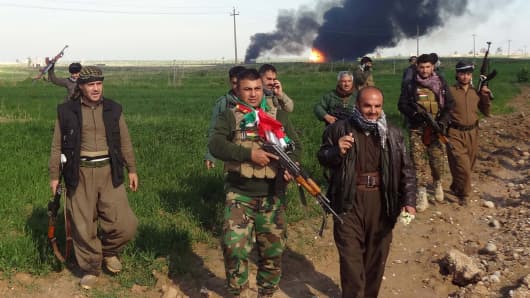Iraqi Kurds are dissatisfied with the Obama administration's security assistance program. Kurds strongly support America's counter-terrorism goals, but they cannot play a meaningful role destroying the Islamic State without the tools to do the job.
U.S. air strikes were pivotal to preventing ISIS from overrunning Erbil, the capital of Iraqi Kurdistan in August. The Kurds are deeply grateful for America's intervention, which came in a nick of time.
Read MoreA turning point in the war against ISIS
Iran was, however, the first country to send a large transport plane with weapons to stem the Islamic State's advance. Germany provided Milan missiles and France delivered 20 millimeter armor piercing munitions, which are effective against ISIS tanks and armored personnel carriers. I recently met Kurdish officials who regret Washington's decision to supply only "light and medium weapons."
The Pentagon's training program is lagging, though there are more than a thousand U.S. military advisers in Kurdistan.
A U.S. official in Erbil explained the slow progress to me during a recent meeting there, noting that peshmerga are spread out along a long front line with ISIS. Kurdish officials refute this claim. When I spoke with them, they insist that peshmerga are ready to receive U.S. military training as soon as it's offered.
Why hasn't the Obama administration intensified its support for the peshmerga (which means "those who stand before death")?
It's surely not lack of experience or knowledge. Chapters 1, 2, 6, 7 and 8 of the U.S. Army Manual on Security Force Assistance includes detailed information on the conceptual, organizational, and procedural frameworks through which the U.S. military provides security assistance.
Read MoreHow the US and Iran could become BFFs
Based on experience providing train-and-equip programs in dozens of countries, the Pentagon is fully familiar with decisions defining the scope of security assistance:
- What is the threat level?
- Is the goal to deter or to attack?
- What do supported units need to accomplish their mission?
- Which types and quantities of weaponry will be provided?
- Are supported units accountable for weapons we provide?
- Can they operate and maintain the weaponry?
- What role for "combat enablers" (i.e. Air Force teams or Special Forces who can call in close air support)?
- What is the risk that U.S. forces may be killed or captured?
These are military decisions. But political considerations define the mission.
It appears that the Obama administration still has not decided whether its goal is to train and equip tactical units that can achieve limited objectives over a short period of time, or to build up a coherent functional army including essential institutions with capabilities for logistics and training. Assisting the peshmerga to function like a regular army could put Iraqi Kurdistan on the path to independence.
Read MoreUS should stop Syria not ISIS: Saudi Prince
The U.S. pursues an "Iraq first" policy, supporting the Kurds just enough to keep ISIS at bay, but no so much as to threaten Baghdad or Iraq's neighbors. Washington is likely tentative because it doesn't want U.S. weapons to be turned on the Iraqi army and it doesn't want a move toward independence to pit Iraqi Kurds against the Turkish armed forces.
The Obama administration cannot have it both ways. If the U.S. is serious about destroying ISIS, it must give the Kurds tools to do the job. Otherwise, U.S. forces will be boots on the ground in the war against ISIS.
Commentary by David L. Phillips, director of the Program on Peace-building and Human Rights at Columbia University's Institute for the Study of Human Rights. He served as a senior adviser and foreign- affairs experts to the State Department. His new book is "The Kurdish Spring: A New Map for the Middle East."



